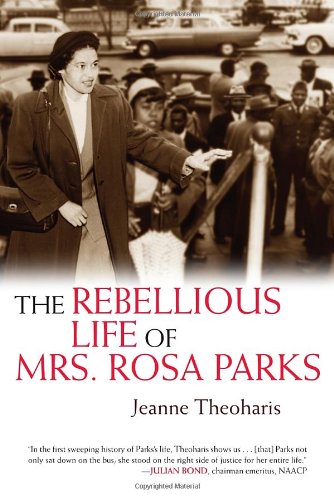
The Rebellious Life of Mrs. Rosa Parks
کتاب های مرتبط
- اطلاعات
- نقد و بررسی
- دیدگاه کاربران
نقد و بررسی

November 12, 2012
In her introduction to this biography, Brooklyn College political scientist Theoharis (coauthor of Freedom North: Black Freedom Struggles Outside of the South) notes the common perception of Rosa Parks (1913–2005): “hidden in plain sight, celebrated and paradoxically relegated to be a hero for children.” Into that gap, Theoharis submits a lavishly well-documented study of Parks’s life and career as an activist. In tracing her work with the Montgomery NAACP and other groups from the 1930s onwards, and then following her move from Alabama after the 1956 bus boycott to Detroit, Theoharis maps a lifetime devoted to civil rights, thereby destabilizing our notions of Parks as a “tired seamstress” who simply kept her seat on a bus one day in 1955. The “iconography of Parks,” as Theoharis shows, can be used as an entry point for understanding the broader trends in the historiography of the civil rights movement. She notes how the “national fable” of Parks offers “its untarnished happy ending and its ability to reflect the best possibilities of the United States,” thus downplaying more subversive philosophies like the Black Power movement, which Parks also championed. Theoharis calls for a reconsideration of Parks’s legacy and of the movement she, Dr. Martin Luther King Jr., and others are responsible for initiating. 16 b&w illus.

Starred review from November 15, 2012
Theoharis (Political Science/Brooklyn Coll.; co-author: Not Working: Latina Immigrants, Low-Wage Jobs, and the Failure of Welfare, 2006, etc.) has discovered the soul of Rosa Parks (1913-2005), and it's not that of a docile, middle-age seamstress. The author successfully goes "behind the icon of Rosa Parks to excavate and examine the scope of her political life." Parks learned to stand up for her rights as a child; she never backed down from black or white, rich or poor when she knew she was right. She began working for civil rights early in her life and was the first secretary of the Montgomery NAACP in 1947. She also wasn't the first to refuse to relinquish her seat on the bus, but the strength of her character and a push too far by the local police made her the poster child for the struggle. Her arrest was the impetus for what began as a one-day Montgomery Bus Boycott. That, in turn, united the black population, which had been deeply divided by class and education. While her refusal wasn't planned in advance, the bus boycott was no spontaneous action. Parks continued to work for equality after she and her husband moved to Detroit, where racism was as bad, if not worse, as that in the South. How Theoharis learned the true nature of this woman is a story in itself. Parks always stood in the background, never volunteered information about herself and eschewed fame. There were no letters to consult; even her autobiography exposed little of the woman's personality. She hid her light under a bushel, and it has taken an astute author to find the real Parks. Even though her refusal to give up her bus seat sparked a revolution, Rosa Parks was no accidental heroine. She was born to it, and Theoharis ably shows us how and why.
COPYRIGHT(2012) Kirkus Reviews, ALL RIGHTS RESERVED.

November 1, 2012
It's time for a big new biography of Rosa Parks, whose refusal to cede a bus seat helped launched the Civil Rights Movement. From the author of four books on civil rights issues.
Copyright 2012 Library Journal, LLC Used with permission.

November 15, 2012
The national narrative on Parks is that of a reluctant champion of civil rights whose single action was refusing to move to the back of the bus in Montgomery, Alabama, in 1955. Historian Theoharis offers a complex portrait of a forceful, determined woman who had long been active before the boycott she inspired and who had an even longer career in civil rights afterward. The image of a quiet seamstress who undermined Jim Crow minimizes Parks' stature as an activist and obscures continued injustice and inequality, Theoharis argues. Drawing on a decade of research, the historian chronicles Parks' personal journey to resistance, her work in the South challenging segregation and promoting voter registration, and her continued efforts in Detroit to address racial restrictions that had ostensibly been resolved by civil rights legislation. Theoharis details the cost of the bus boycott to Parks and her family, including decades of death threats; her strong admiration for radical black activists; and the controversies that continue to surround the disposition of her archival material as factions fight to claim rights to her iconic image.(Reprinted with permission of Booklist, copyright 2012, American Library Association.)

























دیدگاه کاربران